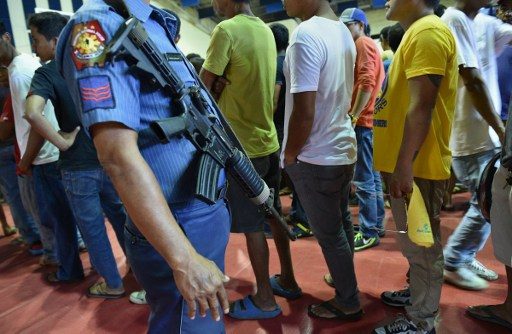SUMMARY
This is AI generated summarization, which may have errors. For context, always refer to the full article.

MANILA, Philippines – The numbers continue to climb in the government’s war against drugs: over 3,000 suspected drug personalities have been killed, and more than 700,000 have turned themselves in to police in the face of the government’s vow to deal with the drug problem with an iron fist.
But human rights groups are concerned with the relentless campaign, raising fears that the rights of drug surrenderees may not be fully respected. Worse, there are stories of some innocents getting caught in the crossfire, having to take measures to clear their name in drug watchlists out of fear for their lives. (READ: On a drug list and innocent? Here’s what you should do)
For those considering turning themselves in to police – or for those who find themselves wrongly placed in a drug list – the Public Attorney’s Office (PAO) should be their first stop.
“Our role first is to ensure that the legal rights of all suspected drug users and pushers will be respected,” said chief public attorney Persida Acosta.
With an estimated 3.7 million Filipinos possibly using illegal drugs, according to President Rodrigo Duterte, Acosta said that the government’s campaign aims to help all Filipinos – both the non-users and the drug users alike. (EXPLAINER: How serious is the PH drug problem? Here’s the data)
“What is important now is to save not only the remaining 95 million Filipino people, but also these 3.7 million Filipinos contaminated, because they’re really victims of this menace,” she said.
Legal help
In the government’s campaign against drugs, PAO lawyers are usually approached by poor, indigent Filipinos seeking legal help. Those intending to voluntarily submit themselves to rehabilitation can execute an affidavit in the presence of a PAO lawyer.
Acosta stressed that this affidavit serves only to facilitate the surrenderee’s petition for treatment and rehabilitation, and cannot be used to incriminate the surrenderee.
This applies even to those who admit their involvement in the illegal drugs trade.
“Wala namang case pending eh. So ang ginagawa lang natin, nirerecommend natin sila for rehabilitation. ‘Yung may mga case pending, talagang makukulong sila. Kasi may case eh, they have to clear their names. ‘Yung mga wala pang case, they are for rehabilitation and counseling,” she said.
(There’s no case pending. So what we’re doing is recommending them for rehabilitation. But for those with pending cases, they will be detained. Because they have a case, they have to clear their names. Those with no cases are up for rehabilitation and counseling.)
PAO also has a memorandum of agreement with the Dangerous Drugs Board. Under this agreement, drug dependents can seek legal help from PAO lawyers to act as their counsel and represent them before the courts in their petition for treatment and rehabilitation.
But Acosta also acknowledged the challenge of bringing PAO’s help to the thousands of surrenderees turning up at police stations and barangay halls nationwide.
Based on police statistics as of September 10, 709,527 drug users and pushers have surrendered nationwide under Project TokHang, a strategy where police go house-to-house in their jurisdictions to convince known drug pushers and users to surrender and change their ways.
But there are only about 1,600 public attorneys nationwide, Acosta said – fewer than the 3,000 courts around the country.
Right to counsel
If a drug user or pusher wants to surrender to police, what should he do? If an innocent person wants to clear his name from the drug list, whom should he call?
In both cases, Acosta said citizens should immediately obtain the services of a lawyer, or avail of PAO’s help before signing any documents or providing information at the police station.
She stressed that both the police and civilians should be aware of Republic Act 7438, which stipulates the rights of persons arrested, detained, or under custodial investigation. It also spells out the duties of arresting officers.
Section 2(a) of Republic Act 7438 reads: Any person arrested detained or under custodial investigation shall at all times be assisted by counsel.
Acosta said that those suspected of being users or pushers of illegal drugs should assert this right and ask to be assisted by counsel. They should ideally go to PAO and get the services of a lawyer even before going to the police station to surrender or to clear their name.
This was what one 26-year-old call center agent did when he found out that he had been listed in the drug watchlist in Manila. The call center agent refused to sign the “surrender form” at the station, insisting that he was innocent, and eventually managed to clear his name with the help of his lawyer.
In such a case, Acosta said that the innocent should not sign any such documents if they do not intend to be rehabilitated.
She also raised concern that these innocents may have been “preys” of individuals seeking to undermine the government’s campaign against drugs.
“They may be preys of those individuals who are trying to destroy and trying to abort the mechanism of the government in this advocacy against drug syndicates. Dapat maingat din mga kababayan natin (Our fellowmen should also be careful),” she said. – Rappler.com
To obtain legal help, PAO may be reached through the following numbers:
- (02) 929-9436
- (02) 426-2075
- (02) 426-2801
- (02) 426-2450
- (02) 426-2987
- (02) 426-2683
Add a comment
How does this make you feel?
![[Vantage Point] Joey Salceda says 8% GDP growth attainable](https://www.rappler.com/tachyon/2024/04/tl-salceda-gdp-growth-04192024.jpg?resize=257%2C257&crop_strategy=attention)
![[ANALYSIS] A new advocacy in race to financial literacy](https://www.rappler.com/tachyon/2024/04/advocacy-race-financial-literacy-April-19-2024.jpg?resize=257%2C257&crop_strategy=attention)


![[In This Economy] Can the PH become an upper-middle income country within this lifetime?](https://www.rappler.com/tachyon/2024/04/tl-ph-upper-income-country-04052024.jpg?resize=257%2C257&crop=295px%2C0px%2C720px%2C720px)
There are no comments yet. Add your comment to start the conversation.